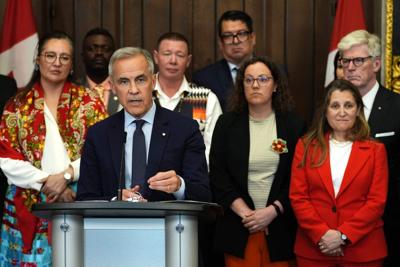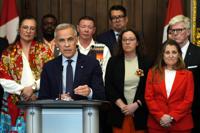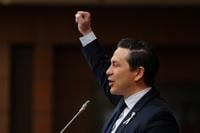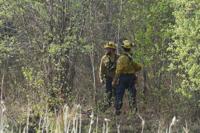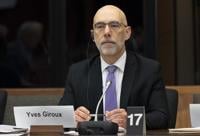TORONTO - Nine First Nations in Ontario are asking a court to declare a pair of federal and provincial laws meant to fast-track infrastructure projects unconstitutional and are seeking an injunction that would prevent the governments from using some of the most contentious aspects.
The Indigenous communities say in the legal challenge filed in the Ontario Superior Court of Justice that the federal law known as Bill C-5 and the Ontario law known as Bill 5 both represent a "clear and present danger" to the First Nations' self-determination rights to ways of life on their territories.
"While the laws do leave open or commit that there will be some First Nation consultation at the very first stage...involvement in that decision alone is a smoke and mirrors trick, deflecting attention from all the other ways the laws necessarily diminish the ability of First Nations to engage on the regimes’ broader consequences," they write in the court challenge.
Bill C-5 allows cabinet to quickly grant federal approvals for big projects deemed to be in the national interest such as mines, ports and pipelines by sidestepping existing laws, while Ontario's bill allows its cabinet to suspend provincial and municipal laws through the creation of so-called "special economic zones."
The First Nations are asking the court for an injunction prohibiting the federal government from naming national interest projects and prohibiting Ontario from implementing special economic zones.
Both the federal and Ontario governments have said their laws are tools to counteract the effects of U.S. President Donald Trump's tariffs by allowing ∫√…´tv development, such as natural resource development, to proceed more quickly.
But this is not a battle of development versus no development, the First Nations argue. Rather, they advocate for "doing it right" by ensuring that necessary information is gathered before proceeding and rights and protections are respected "so the real costs of development do not end up far exceeding their asserted benefit."
"Fragmentation and delay results from Crown choices and unwieldy bureaucracies, not from First Nations," they write in the court document.
"Making changes now in some effort to 'streamline' (or ram through) projects, cannot be at the cost of First Nations, their rights, the Constitution and reconciliation."
The First Nations argue the laws are unconstitutional because they violate charter right to life, liberty and security of the person, as well as equality rights.
Representatives of both governments have said they will respect the duty to consult Indigenous people, but the nine First Nations argue that rings "hollow" because the laws authorize the opposite.
Ontario has already started some consultations with First Nations who "share our vision of unlocking economic opportunity and critical infrastructure in their community and will continue these consultations throughout the summer," the premier's office wrote in a statement.
"We will continue to build consensus with First Nations on shared priorities including legacy infrastructure, all-season roads, and resource development, that support long-term prosperity."
One of the First Nations challenging the laws is Aroland First Nation. Premier Doug Ford used Chief Sonny Gagnon's name several times this spring in defence of Bill 5, saying some chiefs will always be anti-development but others are progressive thinkers like Chief Sonny.
While Aroland has signed a shared-prosperity agreement with the province for major upgrades to roads that lead to the mineral-rich Ring of Fire in northern Ontario, Gagnon has come out against Bill 5. Aroland has never consented to mining the Ring of Fire, he said.
The region is of particular importance in this case, the legal challenge says, since Ontario has said that it both wants the Ring of Fire to be a special economic zone and has asked the federal government to designate it as a nation-building project.
Aroland sits outside the Ring of Fire region with access to the provincial highway system that ends near its territory.¬Ý
Prime Minister Mark Carney has promised to meet with First Nations this week after chiefs said their rights were not respected by a rush to push the bill through Parliament.
Chief Sylvia Koostachin-Metatawabin of Attawapiskat First Nation said in a press release announcing the court challenge that their way of life is not "a pawn in some political game."
“Rushing headlong into major projects without knowing the costs, means the governments are playing a dangerous game with our lands and futures," she wrote.
This report by ∫√…´tvwas first published July 15, 2025.

